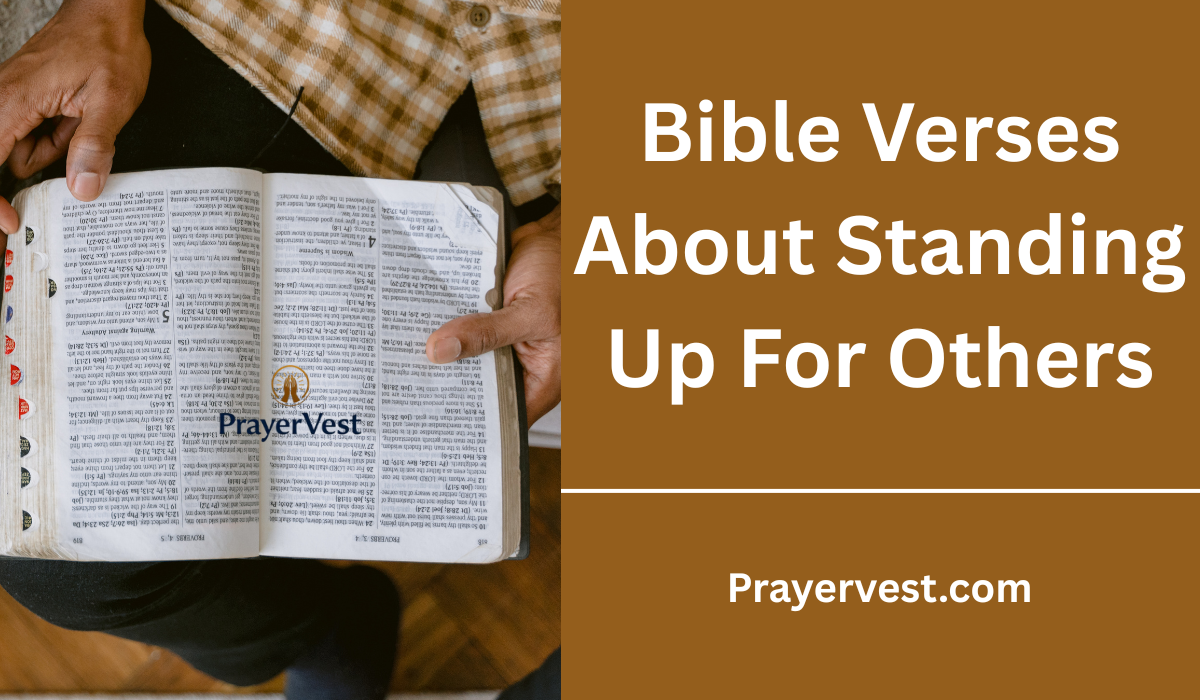Defending others is a potent way to demonstrate justice, compassion, and bravery—values that are ingrained in the Bible. Scripture calls on Christians time and again to stand up for the weak, speak up for the voiceless, and take action for people who are unable to defend themselves.
Standing up for others demonstrates God’s heart for justice and mercy, whether that means supporting the underprivileged and disadvantaged or stepping in when injustice occurs. These verses encourage us to be change agents who uphold justice and truth in our daily interactions and communities.
The Bible has countless instances of people who fearlessly defended others despite peril or hostility. Esther risked her life to save her people, Moses pleaded on behalf of the Israelites during their oppression in Egypt, and the prophets always spoke truth to power.
These stories serve as a reminder that leading a faithful life requires both moral conviction and courage. They demonstrate that God grants protection, strength, and insight to those who come forward, confirming that it is in His will to defend others.


Examining Bible passages about defending others provides direction, inspiration, and useful life lessons. They remind us that advocacy may be demonstrated by words, deeds, and a strong presence during difficult times rather than just large gestures. Believers can cultivate hearts that are perceptive to injustice, sympathetic to the weak, and dedicated to advancing justice and equity by internalizing these teachings. In the conclusion, these verses exhort us to actively defend, promote, and support others around us in order to reflect God’s love.
40 Powerful Bible Verses About Standing Up For Others (2026)
1. Exodus 4:12
“Now go; I will help you speak and will teach you what to say.”
In this pivotal moment, God calls Moses to stand before Pharaoh and lead the Israelites out of Egypt. Moses, feeling inadequate and fearful due to his lack of eloquence, hesitates. God’s response is both empowering and instructive—He promises to be the source of Moses’ speech. This verse teaches us that divine utterance is not rooted in human ability but in divine availability. Even our perceived weaknesses can become vessels of divine speech when we trust in His guidance to stand up for others.
2. Numbers 22:38
“I must speak only what God puts in my mouth.”
This declaration by Balaam, a prophet enticed by wealth to curse Israel, reveals a reverence for the authority of God’s words. Genuine utterance must come from God alone. This verse highlights the sacredness of speaking on God’s behalf and reminds us that advocacy must align with divine will. Standing up for others requires surrendering our personal agendas to speak truthfully and justly, as God directs.
3. Proverbs 31:8-9
“Speak up for those who cannot speak for themselves, for the rights of all who are destitute. Speak up and judge fairly; defend the rights of the poor and needy.”
Proverbs emphasizes the moral imperative to advocate for the vulnerable. Believers are instructed to act as a voice for justice, championing fairness and equity where others are powerless. Speaking up is framed as a spiritual duty reflecting God’s concern for justice and compassion, showing that true righteousness involves courageously defending the defenseless.
4. Isaiah 1:17
“Learn to do right; seek justice. Defend the oppressed. Take up the cause of the fatherless; plead the case of the widow.”
Isaiah calls believers to active engagement in social justice, extending God’s care to those most at risk. Faith is demonstrated through defending the oppressed. By pleading for the fatherless and widows, believers participate in God’s redemptive work, embodying His compassion and righteousness. Standing up for others is both a responsibility and a reflection of God’s heart.
5. Micah 6:8
“He has shown you, O mortal, what is good. And what does the Lord require of you? To act justly and to love mercy and to walk humbly with your God.”
Micah distills godly living into justice, mercy, and humility. Acting justly includes standing up for those wronged, advocating for fairness, and challenging oppression. Loving mercy involves kindness to the vulnerable, while humility ensures our advocacy aligns with God’s will. Together, these principles provide a holistic guide for standing up for others in a godly way.
6. Matthew 25:40
“The King will reply, ‘Truly I tell you, whatever you did for one of the least of these brothers and sisters of mine, you did for me.’”
Jesus equates service to the marginalized with service to Himself. Advocating for the weak is not merely social activism—it is worship and obedience. This verse reminds believers that even small acts of justice and support have eternal significance and reflect the heart of God.
7. James 1:27
“Religion that God our Father accepts as pure and faultless is this: to look after orphans and widows in their distress and to keep oneself from being polluted by the world.”
James emphasizes that true faith is expressed through care for the vulnerable. Advocacy and protection of those in distress are hallmarks of authentic religion. Standing up for others is not optional but a core expression of godly living, showing compassion and integrity in action.
8. Luke 4:18
“The Spirit of the Lord is on me, because he has anointed me to proclaim good news to the poor. He has sent me to proclaim freedom for the oppressed and recovery of sight for the blind, to set the oppressed free.”
Jesus, quoting Isaiah, models the ultimate example of standing up for others. His mission prioritizes the poor, oppressed, and marginalized. This verse challenges believers to emulate Christ’s example by advocating for those silenced or bound by injustice, requiring courage, compassion, and alignment with God’s will.
9. Galatians 6:2
“Carry each other’s burdens, and in this way you will fulfill the law of Christ.”
Paul encourages believers to share in one another’s struggles. Standing up for others is essential to fulfilling Christ’s law of love. Engaging in the challenges and injustices faced by others demonstrates faith in action and cultivates a culture of mutual care and advocacy.
10. 1 John 3:17-18
“If anyone has material possessions and sees a brother or sister in need but has no pity on them, how can the love of God be in that person? Dear children, let us not love with words or speech but with actions and in truth.”
John stresses that authentic faith is expressed through tangible action. Advocacy and assistance require more than sympathy—they demand practical intervention. True love aligns words with deeds, making standing up for others a clear reflection of God’s love in the world.
11. Proverbs 24:11-12
“Rescue those being led away to death; hold back those staggering toward slaughter. If you say, ‘But we knew nothing about this,’ does not he who weighs the heart perceive it?”
This verse stresses personal responsibility in the face of injustice or danger. It reminds believers that inaction when others are at risk is accountable before God. Standing up for others requires vigilance and courage, ensuring we do not turn a blind eye to suffering. God sees the heart’s intent, and our duty to protect and intervene is a measure of our faith in action.
12. Isaiah 58:6
“Is not this the kind of fasting I have chosen: to loose the chains of injustice and untie the cords of the yoke, to set the oppressed free and break every yoke?”
Isaiah highlights that true worship and devotion to God are expressed through acts of justice and liberation. Faith is not passive; it calls for breaking chains and defending those under oppression. This verse encourages believers to take active steps to stand up for the oppressed, reflecting God’s heart for freedom and righteousness.
13. Psalm 82:3-4
“Defend the weak and the fatherless; uphold the cause of the poor and the oppressed. Rescue the weak and the needy; deliver them from the hand of the wicked.”
The psalmist emphasizes that justice involves defending those who cannot defend themselves. God calls His people to intervene on behalf of the marginalized. Advocating for others is not only an act of kindness but also an obedience to God’s command to uphold righteousness and combat injustice in society.
14. Jeremiah 22:3
“This is what the Lord says: Do what is just and right. Rescue from the hand of the oppressor the one who has been robbed. Do no wrong or violence to the foreigner, the fatherless or the widow, and do not shed innocent blood in this place.”
Jeremiah stresses moral and social responsibility, particularly in protecting the vulnerable. God’s call is clear: justice is active, requiring intervention to protect the oppressed. Believers are reminded that standing up for others aligns with God’s commands and demonstrates His justice in the world.
15. Proverbs 31:26
“She speaks with wisdom, and faithful instruction is on her tongue.”
The virtuous woman exemplifies using words to advocate, teach, and protect. This verse demonstrates that standing up for others is not only about action but also about speaking truth and wisdom. Our words can defend the helpless, correct injustice, and guide others in righteousness, reflecting God’s wisdom in our advocacy.
16. Matthew 5:7
“Blessed are the merciful, for they will be shown mercy.”
Mercy is at the heart of standing up for others. Jesus’ teaching links compassion and advocacy, showing that those who actively care for and defend others experience God’s mercy themselves. This verse encourages believers to let mercy drive their actions, motivating advocacy for those in need.
17. Romans 12:15
“Rejoice with those who rejoice; mourn with those who mourn.”
Paul calls believers to empathy as a form of advocacy. Standing up for others is not limited to physical intervention; it also includes emotional solidarity. Sharing in others’ joys and sorrows fosters a supportive community, enabling us to act with greater understanding and love when confronting injustice or hardship.
18. Zechariah 7:9-10
“This is what the Lord Almighty says: ‘Administer true justice; show mercy and compassion to one another. Do not oppress the widow or the fatherless, the foreigner or the poor. Do not plot evil against each other.’”
Zechariah reiterates God’s mandate for justice and compassion. Standing up for others requires intentional protection of those at risk and rejection of oppression. Advocacy and mercy are intertwined, reflecting God’s character in how we treat the vulnerable and uphold righteousness.
19. 1 Peter 3:15
“But in your hearts revere Christ as Lord. Always be prepared to give an answer to everyone who asks you to give the reason for the hope that you have. But do this with gentleness and respect.”
Peter links advocacy with witness. Standing up for others includes defending truth and hope with grace and respect. Believers are called to support those in need while modeling Christlike patience and gentleness, ensuring that advocacy aligns with love and integrity.
20. Hebrews 13:3
“Continue to remember those in prison as if you were together with them in prison, and those who are mistreated as if you yourselves were suffering.”
The writer of Hebrews calls for empathetic advocacy. Standing up for others involves identifying with their suffering and acting as if their plight were our own. True compassion requires action—defending, supporting, and praying for the oppressed—demonstrating practical solidarity in faith.
21. Proverbs 29:7
“The righteous care about justice for the poor, but the wicked have no such concern.”
This verse highlights that advocacy is a mark of righteousness. Those who follow God demonstrate concern for the marginalized and oppressed, ensuring fairness and protection. Standing up for others distinguishes the righteous from the indifferent and aligns believers with God’s heart for justice.
22. Psalm 82:3
“Defend the weak and the fatherless; uphold the cause of the poor and the oppressed.”
The psalmist calls for active intervention on behalf of the defenseless. God’s people are instructed to champion the rights of those who cannot protect themselves. Advocacy is framed as a sacred duty, requiring courage and commitment to uphold justice in every area of life.
23. Deuteronomy 10:18
“He defends the cause of the fatherless and the widow, and loves the foreigner residing among you, giving them food and clothing.”
God Himself sets the example for defending the vulnerable. By following His ways, believers emulate His love and justice. Standing up for others is an act of obedience and reflects God’s care for the marginalized in society.
24. Isaiah 61:1
“The Spirit of the Sovereign Lord is on me, because the Lord has anointed me to proclaim good news to the poor. He has sent me to bind up the brokenhearted, to proclaim freedom for the captives and release from darkness for the prisoners.”
This prophecy, fulfilled in Jesus, highlights the importance of speaking and acting for the oppressed. Advocacy is central to God’s mission, and believers are called to participate in bringing freedom, healing, and justice to those in need.
25. Luke 10:25-37
“Which of these three do you think was a neighbor to the man who fell into the hands of robbers? … Go and do likewise.”
The parable of the Good Samaritan teaches that standing up for others transcends social boundaries. Advocacy involves practical help, mercy, and compassion, regardless of who the person is. True love is demonstrated through action, defending and aiding those in need.
26. Psalm 146:7-9
“He upholds the cause of the oppressed and gives food to the hungry. The Lord sets prisoners free, the Lord gives sight to the blind, the Lord lifts up those who are bowed down.”
This psalm praises God for His protective care. Believers are called to reflect His actions by advocating for justice and helping the needy. Standing up for others aligns with God’s character and mirrors His provision and protection.
27. Ezekiel 22:29
“The people of the land practice extortion and commit robbery; they oppress the poor and needy and mistreat the foreigner, denying them justice.”
Ezekiel warns against the consequences of ignoring injustice. Standing up for others is not optional; failure to protect the vulnerable invites God’s judgment. Advocacy is a moral and spiritual obligation that demonstrates alignment with God’s will.
28. Matthew 23:23
“Woe to you, teachers of the law and Pharisees, you hypocrites! You give a tenth of your spices but have neglected the more important matters of the law—justice, mercy and faithfulness.”
Jesus criticizes religious leaders for neglecting justice. Standing up for others is central to living faithfully. Faith without advocacy is incomplete; believers are called to act with mercy and fairness, not just ritual compliance.
29. James 2:14-17
“What good is it, my brothers and sisters, if someone claims to have faith but has no deeds? … Faith by itself, if it is not accompanied by action, is dead.”
James underscores that true faith requires action. Standing up for others is a demonstration of living faith. Advocacy is not optional; it is the tangible expression of love and commitment to God’s principles of justice.
30. Proverbs 28:27
“Those who give to the poor will lack nothing, but those who close their eyes to them receive many curses.”
This proverb reminds believers of the blessings tied to helping others. Turning a blind eye to suffering has consequences, while advocacy and generosity bring favor. Standing up for others is both a moral duty and a source of spiritual reward.
31. Psalm 82:4
“Rescue the weak and the needy; deliver them from the hand of the wicked.”
This verse emphasizes proactive intervention for the oppressed. Believers are called to act decisively in protecting those at risk. Standing up for others is a reflection of God’s justice, demonstrating courage, compassion, and alignment with His will in the face of wrongdoing.
32. Isaiah 58:10
“If you spend yourselves in behalf of the hungry and satisfy the needs of the oppressed, then your light will rise in the darkness, and your night will become like the noonday.”
Isaiah connects advocacy with blessings. Serving the oppressed brings light and favor into our own lives. Standing up for others is both a moral responsibility and a source of divine reward, showing that God honors those who actively promote justice and mercy.
33. Micah 7:8
“Do not rejoice over me, my enemy; when I fall, I will rise. When I sit in darkness, the Lord will be a light to me.”
Though personal adversity is highlighted here, the broader lesson applies to advocacy: God uplifts the oppressed. Those who stand up for others become instruments of His light, offering hope and restoration to those in darkness and oppression.
34. Jeremiah 5:28
“They are full of greedy lies; they know not how to do right.”
This verse warns against societal injustice and indifference. Standing up for others requires discernment and moral courage to confront wrongdoing. Believers are called to oppose injustice actively and uphold righteousness in their advocacy.
35. Proverbs 22:22-23
“Do not exploit the poor because they are poor and do not crush the needy in court, for the Lord will take up their case and will exact life for life.”
The Bible explicitly commands protection of the vulnerable from exploitation. Standing up for others aligns us with God’s justice and ensures that the defenseless receive care and fairness. Advocacy is a divine mandate that carries both spiritual and practical implications.
36. Exodus 23:6
“Do not deny justice to your poor people in their lawsuits.”
God instructs believers to ensure fairness and protection for those who cannot defend themselves legally. Advocacy involves using one’s voice, influence, or position to secure justice. Standing up for others is a concrete way to mirror God’s righteousness in everyday life.
37. Deuteronomy 24:17-18
“Do not deprive the foreigner or the fatherless of justice, or take the cloak of the widow as a pledge. Remember that you were slaves in Egypt and the Lord your God redeemed you.”
This verse reminds believers that advocacy is rooted in empathy and remembrance of God’s deliverance. Protecting the vulnerable is a reflection of God’s redemption and compassion. Standing up for others connects faith with moral action and justice.
38. Luke 12:48
“From everyone who has been given much, much will be demanded; and from the one who has been entrusted with much, much more will be asked.”
Jesus teaches that privilege comes with responsibility. Those in positions of influence or knowledge are called to defend and uplift others. Standing up for others is a duty that accompanies God-given blessings, ensuring that resources and power are used for justice and compassion.
39. Romans 15:1
“We who are strong ought to bear with the failings of the weak and not to please ourselves.”
Paul urges believers to use their strength to support those who struggle. Advocacy involves patience, empathy, and a willingness to prioritize others’ needs. Standing up for others reflects Christlike humility and a commitment to communal care.
40. Colossians 3:12-13
“Therefore, as God’s chosen people, holy and dearly loved, clothe yourselves with compassion, kindness, humility, gentleness and patience. Bear with each other and forgive one another if any of you has a grievance against someone.”
This passage emphasizes the virtues necessary for effective advocacy. Compassion and patience equip believers to stand up for others wisely and lovingly. By embodying these qualities, believers can address injustice with integrity and mercy, reflecting God’s heart in all their interactions.
Conclusion
In conclusion, Bible passages that advocate for others serve as a reminder that faith is an active, not passive, activity that calls on believers to act with compassion, justice, and courage. The necessity of protecting the weak, standing up for the voiceless, and opposing injustice wherever it arises is emphasized over and time again throughout God’s Word. By abiding by these heavenly directives, we not only glorify God but also give people in need encouragement, hope, and safety. In a society that frequently ignores the weak, standing up for others is a practical way to demonstrate God’s love and righteousness.
In the end, these texts push us to cultivate hearts that are aware of injustice and dedicated to taking action. Believers are asked to be change agents and protectors, whether by advocacy, support, or brave intervention. We exhibit God’s nature, advance justice, and encourage others to follow suit when we defend the rights of others. Our faith becomes a living example of love, morality, and divine purpose in the lives of people around us as we live out these values.






